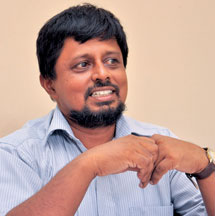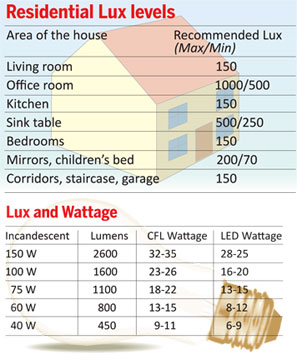Energy-efficient practices will help reduce electricity bills
by Gamini Warushamana
|

N.W.K. Jayatissa
|
With the massive electricity tariff which comes into effect this
month, consumers are struggling to reduce electricity consumption.
There are limited options for cutting consumption because lifestyles
cannot be changed overnight. However, enjoying sophisticated electrical
appliances with power supply at subsidised rates is now over and the
true cost has to be met by consumers.
Energy consultant and senior lecturer of the Department of Physics of
the University of Kelaniya, N.W.K. Jayatissa said that consumers can
reduce electricity bills by minimising waste and adopting energy-
efficient practices.
Jayatissa is an energy consultant in Sri Lanka and New Zealand.
Following are excerpts of an interview with Sunday Observer Business.
Sri Lanka is among low electric power consuming countries with a per
capita power consumption (KWh per capita) at 449 in 2010. However, with
increasing per capita income and changing lifestyles, energy consumption
is increasing. For instance in 2000, our per capita power consumption
was 290 Kwh. Sri Lanka can yet save energy by introducing energy-
efficient practices.
 "In energy management we can consider three sectors; households,
industries and commercial establishments. I will focus on the household
sector. In households, energy consumption depends on various factors
such as number of members in the family and of course lifestyles." "In energy management we can consider three sectors; households,
industries and commercial establishments. I will focus on the household
sector. In households, energy consumption depends on various factors
such as number of members in the family and of course lifestyles."
Management of energy in households should be initiated at the
designing stage, before the construction of the house. Orientation of
the house to make maximum use of daylight, ventilation, thermal
resistance of the material used for walls and the roof are some of them.
There are scientific methods to minimise energy use considering these
factors.
However, in Sri Lanka we still do not observe them. In developed
countries there is an energy rating system for houses and it is an
important aspect in the pricing of houses.
If we are to consider saving energy in our homes, we need to have an
idea of what share of our energy bill is being used for lighting,
cooking and heating. According to recent research conducted by the
students of the Department of Physics of the University of Kelaniya,
35-40 percent or the highest share of our electricity bill is for the
refrigerator while around 20 percent is for lighting, around 25 percent
for ironing and the TV and the rest for other purposes. Therefore, we
should find out the energy killers in our households and introduce more
energy-efficient practices.
Refrigerators
Old refrigerators that are in use today are real energy killers. New
technology has been developed and the latest refrigerators have more
energy-efficient compressors and cooling methods.
Therefore, replacing your generations-old refrigerators with new ones
may help you cut the electricity bill. New refrigerators have energy
ratings that give an idea of their energy efficiency.
The size or the storage capacity of your refrigerator should depend
on the number of people in the house and consumption pattern. In most
cases, refrigerators are large and oversized and underserve the purpose
for which they are meant.
Energy consumption of a refrigerator increases with the increase in
frequency of opening it. If there is lot of space or air in the
refrigerator cool air comes out every time you open it and more energy
is needed to re-cool it.
Therefore, you should minimise empty space by packing stuff as much
as possible in the fridge. You can store things such as water bottles to
fill the space. If you can store the stuff in an orderly manner in your
fridge and pre-decide what you want to pick before opening the fridge
you can minimise energy waste.
Hot stuff should not be put into fridge until it reaches room
temperature. Clean the door beadings and coils of your refrigerator
frequently. Keep the fridge in a place where there is ventilation and no
direct sunlight, which may also help to reduce energy waste.
Lighting
Energy efficient houses can be designed to get the maximum benefit
from daylight. There are standard architectural designs for this. You
can save energy by selecting suitable bulbs for different purposes in
your house.
The bulbs should be selected based on Lumens and Watts. Watts measure
the amount of energy used by bulbs and the Lumens is the measure of
brightness provided by a bulb. The more the Lumens, the brighter the
bulb. Selection of the bulb should be also be based on the lux level of
the light that is needed for the purpose.
There are recommended lux levels and it may vary from country to
country.
Table 1 gives a guideline. Lux is the light density so you have to
multiply it with room area to find out the required Lumens.
Table 2 gives the relationship among candescent, CFL and LED bulb
wattage levels and lumens.
You should look at lumens of the bulb not the wattage when you
purchase a bulb. CFL and LED bulbs are energy- efficient options that
can save a significant amount from the electricity bill. A single switch
for a single bulb and dimmers can be also used to save energy in the
lighting of houses.
Rice cooker
The rice cooker is another appliance that consumes more electricity.
Since gas is cheaper than electricity in Sri Lanka, you can reduce 7-8
units of electricity consumption and total energy cost by shifting to
gas. This is an option for consumers in the margin of 90 units who want
to keep consumption below 90 units. Small pedestal fans are more energy
efficient compared to ceiling fans. The fan should be selected
considering the size of the room. If the fans are wobbling, energy waste
is high.
The size of the washing machine should be decided considering the
number persons in the family. Large oversized washing machines waste
energy. If you wash a full load you can save energy, because even for a
half a load the washing cycle is the same. Overloading leads to a longer
drying time and energy waste.
Ironing
Electricity can be saved if you iron clothes in bulk. May be what you
need for the whole week, at once. Loss can be minimised if you start
ironing with heavy clothes and end with soft clothes. If you hang the
clothes after washing, the ironing time could be reduced.
The solar-powered hot water system is the cheapest option. Water
heating consumes a significant amount of electricity and this is one of
the convenient alternative energy use options at household level.
Air conditioning
In Sri Lanka we do yet not use a scientific approach by calculating
the cooling load in the installation of AC machines and therefore it is
one of the main energy wasters.
There are several important factors that should be considered.
External heat that comes into the room depends on solar heat, the
direction of sunlight, thermal resistance of roof and walls, thickness
of the walls while the internal load depends on the number of people and
appliances working in the room. The cooling load is calculated using all
these factors.
The size of the machine is determined by adding 10 percent to the
cooling load. Other factors such as direction and height of installation
of the AC machine, distance between machine and splitter, and insulation
of the room have to be considered.
Electricity consumption of a correctly installed AC machine is a
little more than the amount consumed by a fan. Most of the AC machines
installed by vendors are oversized and they only attempt to sell a
machine. Such machines always work at an inefficient range and waste
energy.
People's knowledge on energy-efficient methods and the correct use of
electrical appliances is extremely low in Sri Lanka.
They make decisions based on commercial advertising which gives wrong
information. The Government too has a responsibility to educate people
on methods of efficient energy use.
Most of the electrical appliances are no longer luxuries and they are
essential household equipment and therefore even with the huge rate
increase, people cannot change their lifestyles overnight. The
co-operation of all family members is essential to implement energy
saving practices. |


